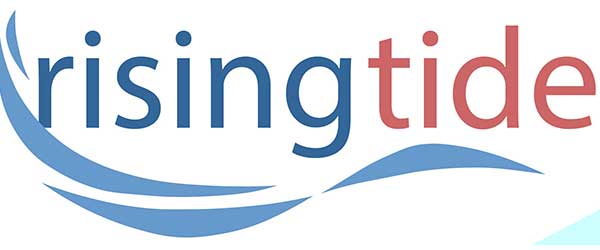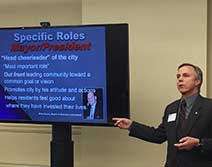
Project Rising Tide is a program established by Governor Snyder in 2015 – and administered by Michigan’s Talent and Economic Development (TED) team – to help economically challenged communities become better positioned for redevelopment opportunities. The mission of the program is to provide at-risk communities with the tools they need to design and build a successful economic framework. It supports vibrant, thriving communities to attract business investment and talent by creating a sustainable path toward economic stability and growth. The ten communities selected for the pilot program are: Central Lake, Charlotte, Evart, Grayling, Harrison, Hillsdale, Newberry, Paw Paw, and River Rouge.
Effective Public Service

Navigating the Talent Pool in Local Government
April Lynch, Ferndale city manager, drew on her wealth of human resources experience for her presentation. She stressed that a city is technically a “business” with thousands of “customers” (residents). As such, city leaders should have the have the mindset of hiring quality talent. Attracting that quality talent has become more difficult because local government benefits aren’t as generous as they used to be. With that in mind, we need to provide services to make employees feel supported, valued, and that they have an opportunity for growth and development. In Ferndale, the city offers services like flexible work schedules, family friendly policies (Ferndale was the first Michigan city to offer paid parental leave), and The More You Learn, the More You Earn, a cross-training program that rewards motivated employees, contributes to their job growth, and ultimately provides better service to Ferndale residents.
Civic Engagement Strategies
The League’s Sarah Craft shared some of her experiences working with communities across the state on community engagement strategies. Engagement is not a cookie-cutter process, but rather can take a variety of creative forms. For example, a Vassar visioning event morphed into Vassar Vision Taste & Talk – a unique, outdoor event that combined two things most people love: food (from local restaurants) and talking! Â There are several elements that go into making any engagement strategy successful: a steering committee (solicit a broad, diverse group of stakeholders); institutional partners (involve local businesses and nonprofits); visioning (decide what you want to accomplish); and marketing and communications (keep people updated often and celebrate successes).
Grant Writing
Julie Hales-Smith, a consultant with North Coast Community Consulting, says you never get anything if you don’t ask, so she advised the audience on how to ask for grants for community projects. Writing grants is very time-consuming, so the first step is to make sure it’s the right grant for your needs. Are you eligible? What’s required? Is it feasible? If the answer is yes, then identify your team, chart out all the steps, timeframes, and responsibilities. Above all else, follow the grant funder’s instructions exactly and get your proposal in on time. Once it’s submitted, work your contacts to see what their experience has been with the funder, and nurture your relationship with the funder.
Structuring the Project – The Local Perspective
Deborah Stuart, Mason city administrator, shared her experiences with development projects in her community. She said that Mason has had several new developments or redevelopments in recent years, which have been good for the city in many ways, but they haven’t added anything to the city’s general revenue. The status of the properties (brownfields, Land Bank properties, etc.) was such that the revenue went to other entities. However, the developments do increase the city’s costs as they have to provide them with services, such as police and fire. She urges that any development project be evaluated on a number of factors, including the cost/benefit ratio and the impact on local jobs. And don’t be afraid to negotiate the best deal for your community.
[/fusion_text][/fusion_builder_column][/fusion_builder_row][/fusion_builder_container]